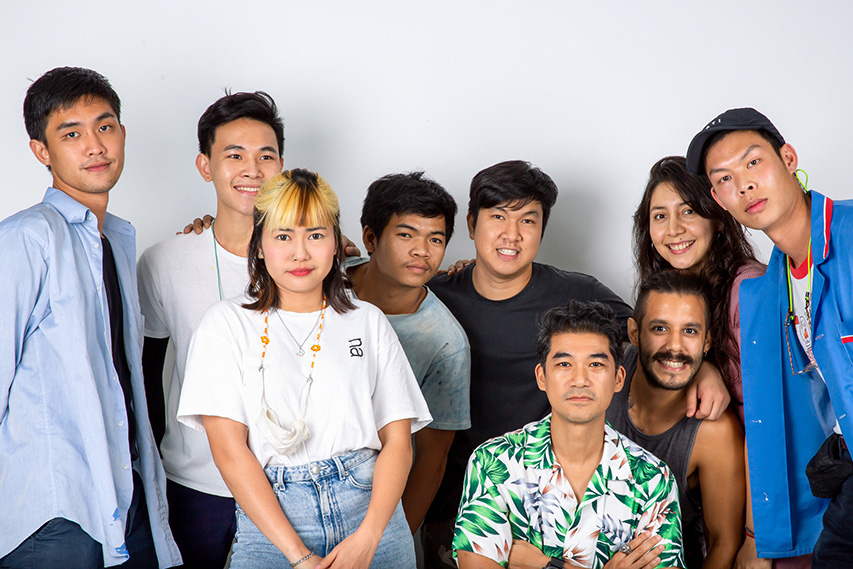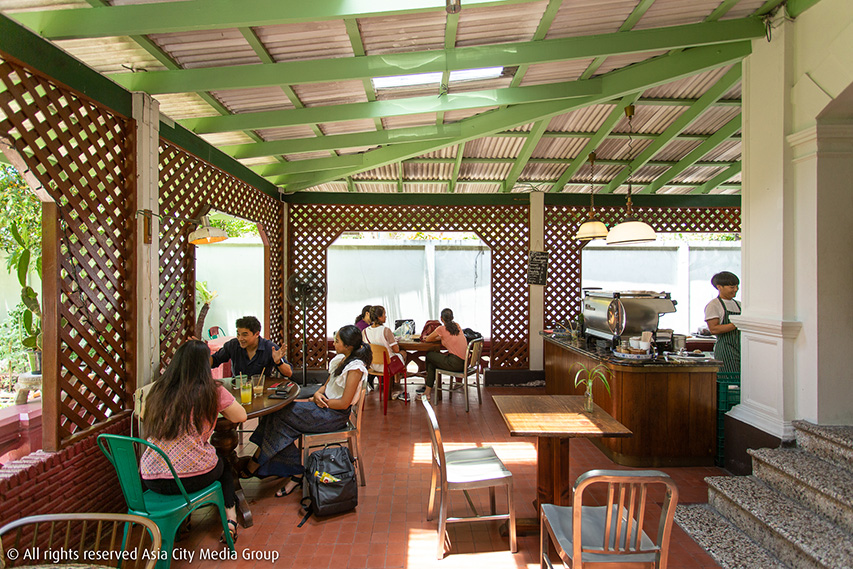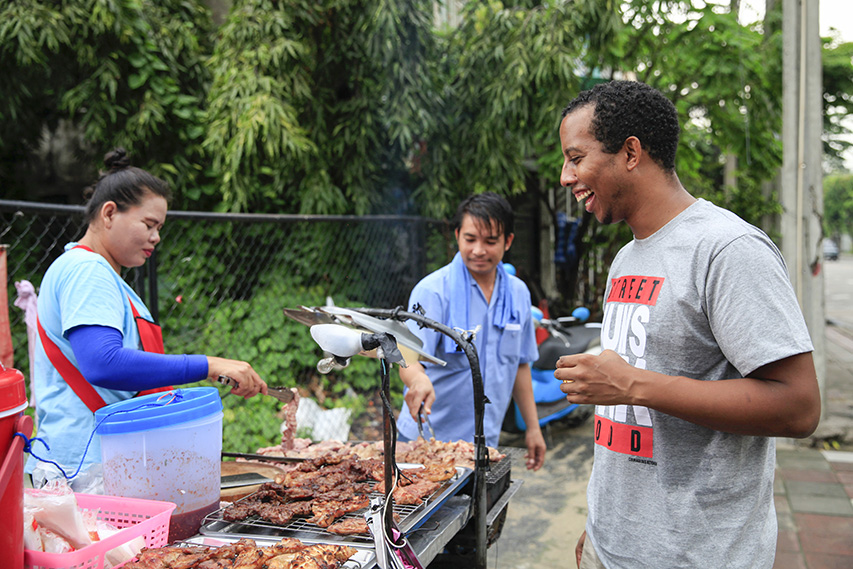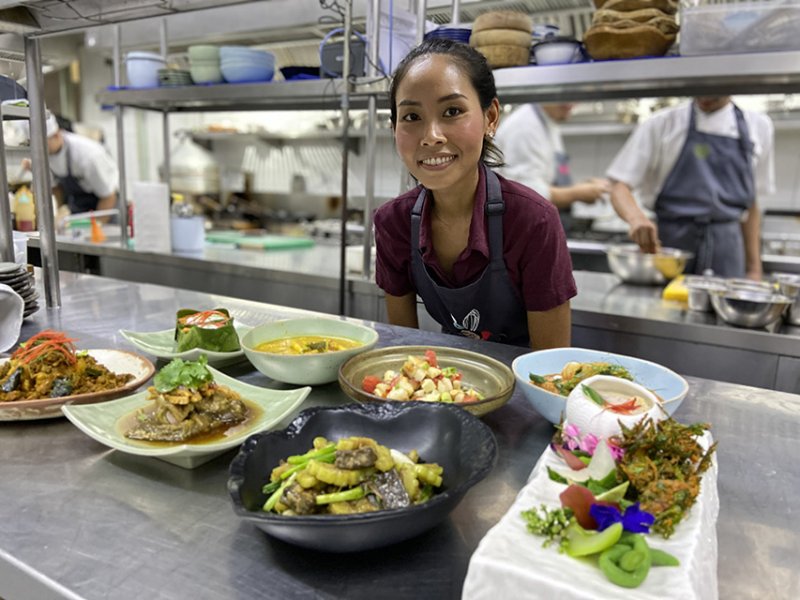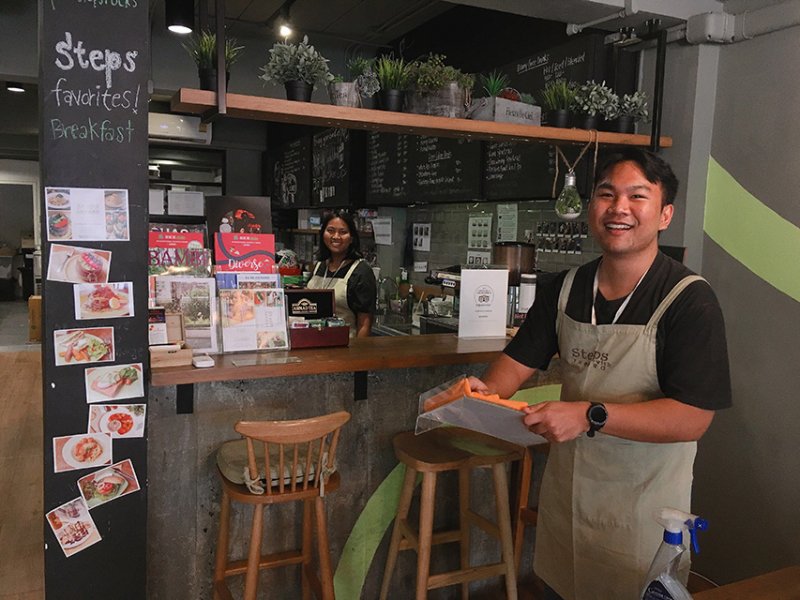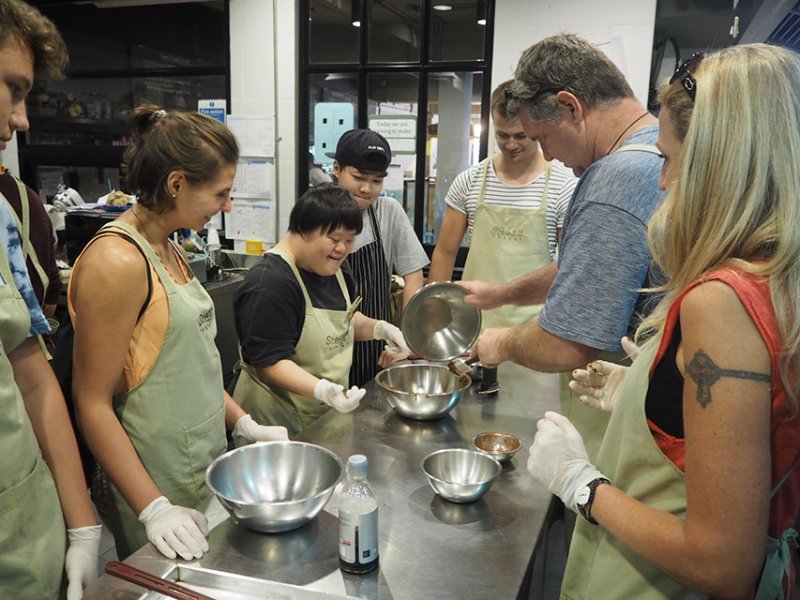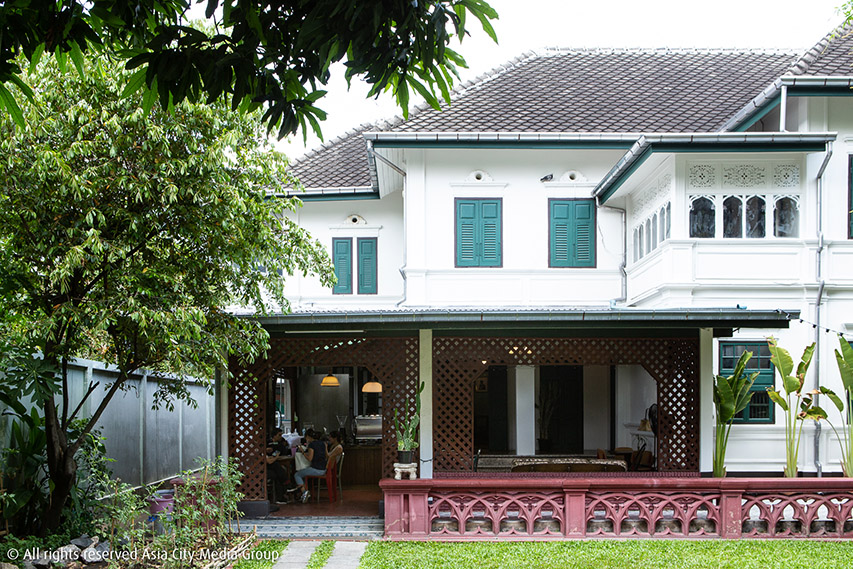It’s a scene made for filmmakers.
On an unusually cool and crisp afternoon, a group of children are sitting outside in a perfectly manicured garden, learning English. Sunlight reflects off the hulking, eggshell-white walls and holy basil-green shutters of the 122-year-old
Bangkok 1899 building in the Nang Loeng district, framing the children and their teacher. Far removed from the city’s tortuous warrens of concrete and chaos, the setting makes you question—if only for a moment—whether you’ve found paradise.
Sakson “Saks” Rouypirom breaks the silence, as well as the cinematic mirage.
“You see the young girl sitting over there? She’s nine. Her mom is 17 years old and in jail, again,” he says.
Despite Thailand dubbing itself “the land of smiles,” the country’s sunny facade often masks darker issues: a problematic relationship with refugees, an overwhelming number of at-risk youth, and the taboo topic of disability discrimination.
There is hope, however, thanks to pioneers like Saks taking matters into their own hands and connecting with vulnerable groups through the one thing that unites us all: food.
Saks is well-known in the non-profit sector. The founder of
Sati Foundation, launched eight years ago on the principle of helping at-risk and underserved families, Saks teamed up last year with Diloklarp “Him” Janthachotbutr to launch
Na Cafe at Bangkok 1899 (now known as just Na).
Originally known as Ban Chao Phraya Thammasakmontri, Bangkok 1899 launched as a non-profit arts and culture center hosting a cafe-restaurant, Na, as a collaborative space that uses food and drinks as a catalyst to create social impact.
Among the litany of programs they manage are training and workshops for urban refugees as well as vocational training programs for at-risk youth, like the young girl he points out to us as he explains the project’s mission.
Image: Saks, Him, and team members from Na at Bangkok 1899
As Somchai Jitsuchon, research director for the Thailand Development Research Institute (TDRI), recently wrote in
The Bangkok Post, “[Inequality is] the root cause of many structural problems in Thai society. The lack of social and political stability, the low quality of democracy, the flesh trade and human trafficking, crime, corruption... you name it. These social evils are different manifestations of structural problems that share the same root cause—inequality.”
While food might not seem the obvious conduit for addressing inequality, or for improving the lot of the estimated one million children who live in vulnerable conditions in Thailand and are “most at risk of being involved in the worst forms of labor,”
according to UNICEF, Saks believes it’s the first step in a long journey toward knowing how to help oneself.
“Na is not only a restaurant or coffee shop—it acts as a training center,” he says, adding that most of the kids they work with didn’t go to school or learn how to read and “end up hating themselves.”
“We really try to turn that around from an early age and build them up to find their worth and understand the meaning of self-empowerment,” he says.
Image: Na at Bangkok 1899
That vision was put to the test this year.
The restaurant had just opened its doors a few months before Covid-19 forced the founders to adjust their operating model. While Saks and Him were forced to shut Na’s doors temporarily, they turned the pandemic into a lesson in how to make lemonade out of lemons. Quickly, they turned Na into a hub for people to drop off donated goods and also acted as a soup kitchen for affected communities.
“We were providing 2,500 meals a week, which totaled to over a million meals, thanks to the support of the community and chefs like Garima Arora (
Gaa) and Chudaree ‘Tam’ Debhakam (
Baan Tepa), who had surplus food and would come by to cook or give us food,” says Saks.
Displaced but not in despair
Image: Dwight Turner of Courageous Kitchen
While Na works on giving Bangkok’s youth an opportunity to live with purpose, the people at
Courageous Kitchen, a five-year-old, food-focused non-profit organization, work on providing financial support, education, and recreational activities for displaced refugee communities.
Owing to regional instability as well as its geolocation, Thailand has long been a common landing point for refugees. The UN High Commissioner for Human Rights (UNHCR) reports that “
there are some 97,000 refugees in Thailand. Most refugees are ethnic minorities from Myanmar, mainly Karen and Karenni.” In addition, “there are approximately 5,000 refugees and asylum-seekers of some 40 nationalities who live in Bangkok and the surrounding urban areas.”
Thailand, however, is not a party to the 1951 Refugee Convention. Only in 2019 did it take a first step toward fulfilling its pledge to improve protection for refugees by initiating the
National Screening Mechanism, which would help eligible refugees receive protected person status.
The reality is refugees in Thailand do not have it easy. Most have fled their home countries to avoid religious persecution or violence, forced exiles in search of a better life for their families.
Many live in constant fear of Thailand’s security forces, who are known for deploying mass raids to uncover people residing in the country without proper travel documents, a violation of Thailand’s immigration act— something Dwight Turner, the founder of Courageous Kitchen, learned the hard way.
Turner, a part-time blogger, teacher, and cook, is the heart and soul behind Courageous Kitchen. Originally a school teacher, Turner switched gears after volunteering at the refugee center run by the UNHCR, teaming up with his wife, Panisha Chanwilai, to launch the non-profit.
“I wanted to do more, so I started raising money for orphanages through events, but... people were more interested in the party than the cause. I moved on to teaching at the refugee center, and then I went into the communities, but about five months in, there was a huge raid and all my kids and their families were arrested,” he says.
While visiting the jail, he realized that many of the men were fathers and breadwinners and had been working illegally on construction sites to support their families.
Beyond documentation, jobs, or even a sense of belonging, these refugees and asylum seekers were also living locked up in poorly kept confinements, in constant fear of running out of food.
“After visiting [a jailed refugee], both of us trying to communicate in our broken Thai for three days, I realized his family was going hungry. He had five daughters and zero food in the house—all they had were five bottles of cooking oil,” he recalls.
Image: Courageous Kitchen
Most urban refugees in Thailand live in a state of purgatory. Unable to enter the system, they can’t work. That means they can’t provide for their families or send their children to school, which pushes many toward exploitative industries to make ends meet.
Even if they are granted refugee status, their chances of being resettled outside of Thailand are low, and they face very real health and safety concerns in the meantime, according to legal counselors
Asylum Access.
Turner hopes to provide opportunities that might keep refugees out of harm’s way.
After launching their first cooking class for at-risk kids in 2017, the Courageous Kitchen crew started hosting tourists and locals to help raise funds for their programs. They also welcomed volunteers who wanted to share their time and skills with affected young groups, especially ones who were malnourished or had low self-esteem.
“Typically, Courageous Kitchen runs as a cooking school and offers walking tours. The money raised through these activities helps to fund rental costs, food costs, cooking classes, and English classes for refugee communities,” Turner says.
While the Courageous Kitchen receives the bulk of its financial support from these guests, its mission goes beyond the inner workings of the wok.
Turner and company use the kitchen as a platform to educate and motivate young students through cooking, English, math, and basic business classes. They also bring their programs to the communities to encourage more nutritious eating and cooking methods at home.
Although the Courageous Kitchen has had to adapt to the lack of tourists in Thailand, Turner says they’re still going strong: currently, he and his team offer virtual cooking classes through Zoom and prepare plant-based meals for delivery.
Providing equal opportunities
Image: Steps with Theera
Perhaps one of the greatest challenges facing at-risk communities in Thailand is a lack of awareness of their plight. Not everyone, however, is closing their eyes to the problems.
The folks at
Step with Theera, for example, are working to change the way Thailand views another major social stigma: people with disabilities.
That’s where Max Simpson and partner Theeta “Uang” Hotrakitya come in.
Through their budding social enterprise and expanding restaurant group, the two hope to provide a bridge from education to employment for people with disabilities and special needs.
The seeds for the initiative were planted years ago, while Simpson worked in an eye-opening role as deputy head of a special needs school.
“They had children from age two to adults in their 30s, all in the same program, but the older guys never got the chance to move on into employment,” she says, adding that more than 90 percent of people with disabilities who finish primary school never advance beyond that point.
Disabilities often carry stigmas in Thailand. Family members tend to believe they are karmic justice for past misdeeds and find them shameful, according to Simpson.
“Once you leave Bangkok, when you’re in the provinces, there’s not a lot of awareness of disabilities. Many do not know that their child has anything different about them or that they might need extra support, especially if it’s learningrelated,” she says.
That leads to a jarring lack of inclusion for people with disabilities in the education system and workforce. “There’s quite a big barrier to entry,” says Simpson.
“Many adults have never met anybody different than them, and there’s a general belief that [a person with special needs] may be less capable, less of an asset to the team.”
The low number of employed people with disabilities is hard to reconcile with Thai law, however. The Quality of Life Promotion Act for Disabled Persons, enacted in 2007, requires every company with 100 employees on staff to employ one who is disabled or else pay a fine to the government that is equivalent to a minimum wage salary.
Image: a Steps with Theera workshop
Many companies have not met that quota, whether by choice or because of the nature of the work they do.
But Steps with Theera offers hope for a more equal future in which people with disabilities might enjoy the same opportunities for career growth as their peers.
Operating as a restaurant and school, Steps with Theera boasts specialists in mental health speech, language therapy, and occupational therapy who help to provide not just training and qualifications, but also real life experience. “[That] gives this platform where trainees get to experience real work with customers, who see them being valued, doing things that perhaps they didn’t expect they could,” she says.
The initial training, which lasts from six months to a year, happens at the main branch in Ekkamai, where special needs-trained chefs, bakers, and baristas work as job coaches.
“We offer everyday soft skills that anyone in the workplace would gain,” Max explains. “Can you turn up to work on time, are you dressed appropriately, can you resolve problems with your colleagues?”
Aside from soft skills, the team also focuses on basic life skills, ranging from how to open a bank account and budget your money to using an ATM.
Thanks to its efforts, Steps with Theera has so far teamed up with 20 employment partners who have agreed, in principle, to diversify their staff with their graduates. To this point, nearly half have completed diversity and inclusion training and are either actively employing Steps with Theera graduates or providing internships for its trainees.
Actions speak louder than words
Image: Na at Bangkok 1899
As the sun dives behind Bangkok 1899, Saks takes one more look out at the young girl learning English on the lawn.
“For two years, we’ve been working with social services to get her out [of her broken home],” he says with a hint of relief.
“Finally, we were able to get her into an all-girl Buddhist boarding school—fully covered. We drop her off next week.”
Were it not for initiatives like Na at Bangkok 1899, she might have become another statistic.
The problem is clear. The solutions, less so. But for the people behind Na at Bangkok 1899, the Courageous Kitchen, and Steps with Theera, food has been an effective agent of change.
Food passes no judgment. It sees no race, religion, or gender. Through food, people at risk in Bangkok might have real, lasting opportunities to exit their limbo, and in the process it might make us all more empathetic of their circumstances.
“The feeling you get by stepping in and helping truly lasts forever,” says Saks.
